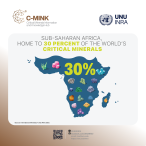On 19 November 2024, a UNU-IAS event at the 2024 UN Climate Change Conference (UNFCCC COP29) in Baku shared experiences and insights for facilitating meaningful youth participation in addressing global environmental challenges. It featured diverse youth perspectives, including those of two high school students participating in a UNU-IAS youth empowerment initiative. Held as part of the Paris Committee on Capacity Building (PCCB) Hub, the event discussed capacity building needs and priorities to support youth empowerment at the global level.
A discussion between youth representatives was moderated by Akio Takemoto (Head of Programme & Administration, UNU-IAS). Opening the event, he recognized the crucial role of youth in addressing the interconnected issues of climate and biodiversity loss. He stressed that this requires expanded capacity building to impart science-based knowledge and leadership, and introduced two innovative UNU-IAS initiatives supporting youth engagement in international policy processes. The Global Youth MIDORI (GYM) Platform has provided training to 18 young participants and supported two selected university students to participate in the 2024 UN Biodiversity Conference (CBD COP16). The Next-Generation Leader Development Program has trained 13 high school students, supporting two to join COP29.
Axel Erikson (Training Manager, Climate Youth Negotiators Programme / Global Youth Biodiversity Network) identified barriers to youth engagement in climate and biodiversity negotiations, and called for young people to be seen as collaborators and champions rather than beneficiaries. He noted that youth recognize the interconnections between climate change and biodiversity, and called for youth groups to promote common messages across different policy processes. Flore Ghetti (Representative to the UN and SGI Programme Coordinator, SGI Office for UN Affairs) emphasized that the differences between the policy processes for climate and biodiversity made it difficult for youth to contribute. She underlined the need for peer-to-peer learning between youth on ways to effectively influence these processes.
Two high school students supported by the UNU-IAS Next-Generation Leader Development Program shared their activities, as well as the messages that they would bring back from COP29. Nanako Kaji (Izumigaoka High School) introduced efforts to address the problem of abandoned farmland in Ishikawa Prefecture, Japan. She noted that COP29 events had highlighted the interlinkages between many problems related to climate and biodiversity, and she suggested that youth had a responsibility to consider tradeoffs. Mari Honda (Kanazawa University Fuzoku High School) explained the potential of carbon-neutral ports and offshore wind power to benefit local populations in Japan. At COP29 she had learned how nature-based solutions for climate change could bring synergies in areas such as poverty and inequality. The students plan to share their experience with their classmates and the broader community in Ishikawa Prefecture to raise awareness of climate change and encourage action, particularly by youth.
The event featured audience engagement through an interactive quiz and a discussion session, in which youth were encouraged to be visionary and take every opportunity to speak up in negotiations.
The event was organized in partnership with the UNU Vice-Rectorate in Europe (UNU-ViE).





